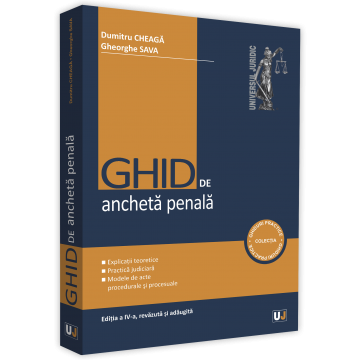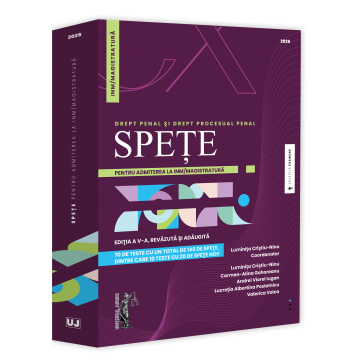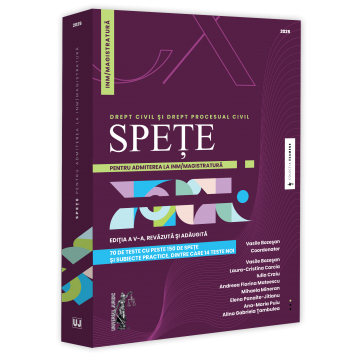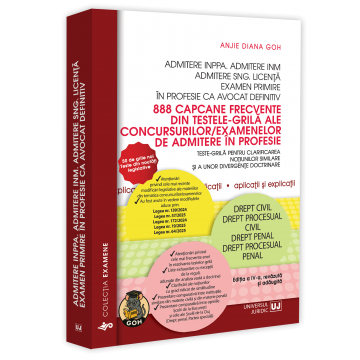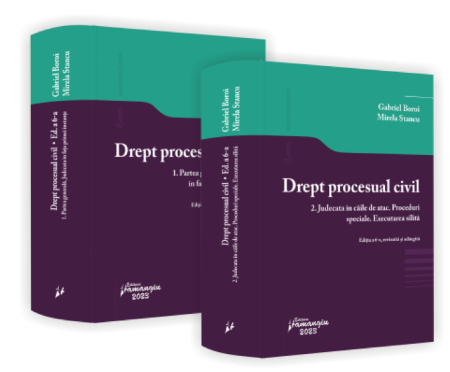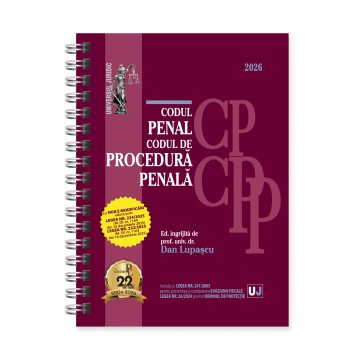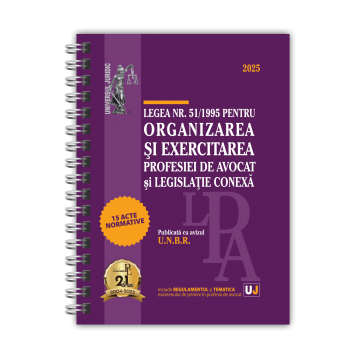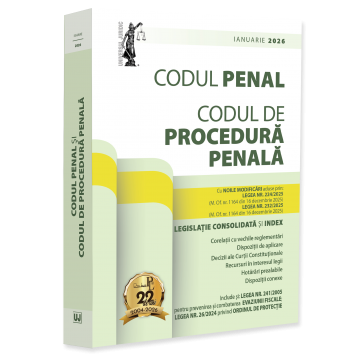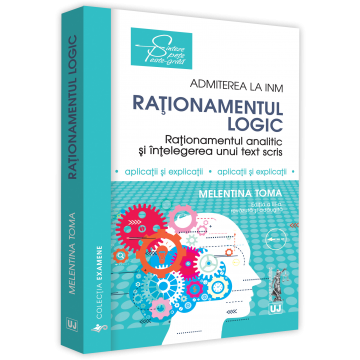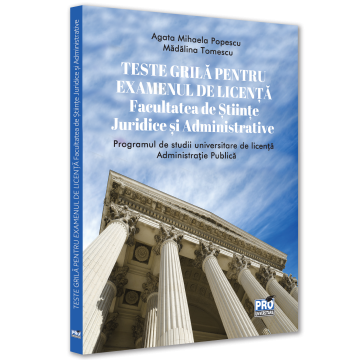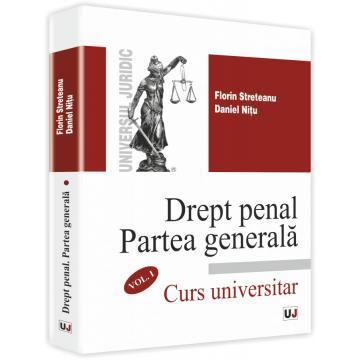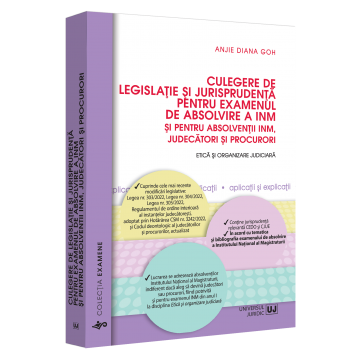Manuscript proposals: [email protected] / 0745 204 115 //// Tracking orders Individuals / Sales: 0745 200 357 / Orders Legal entities: 0721 722 783
6359.png) The principle of the priority of application of European Union law in the jurisprudence of Romanian courts
The principle of the priority of application of European Union law in the jurisprudence of Romanian courts
6359.png)
Publisher: Editura Universitară
Author: Daniel-Mihail Sandru, Constantin-Mihai Banu, Dragos-Alin Calin
Edition: I
Pages: 536
Publisher year: 2024
ISBN: 978-606-28-1240-9
DOI: 10.5682/9786062812409
Product Code:
9786062812409
Do you need help?
0745 200 357
- Description
- Download (1)
- Authors
- More details
- Content
- Reviews (0)
The present volume gathered a number of 66 court decisions pronounced by the courts in Romania, in the interval 2007 - 2024, in the most diverse matters, trying to cover as wide a palette as possible of using the principle of priority of application of European Union law.
-
The principle of the priority of application of European Union law in the jurisprudence of Romanian courts
Download
DRAGOS-ALIN CALIN
CONSTANTIN-MIHAI BANU
DANIEL-MIHAIL SANDRU
CONSTANTIN-MIHAI BANU
DANIEL-MIHAIL SANDRU
The present volume gathered a number of 66 court decisions pronounced by the courts in Romania, in the interval 2007 - 2024, in the most diverse matters, trying to cover as wide a palette as possible of using the principle of priority of application of European Union law.
Introduction / 15
I. Beginnings / 30
I.1. Restriction of the right to free movement of persons. The decision of a member state of the European Union to expel a citizen of another member state does not attract, by law, the latter's obligation to take measures to prohibit the freedom of movement of its citizen. The citizen who is expelled benefits from the procedural rights to challenge the expulsion measure in court, before the authorities of the state that ordered this measure, they being sovereign to decide on its necessity / 30
Bucharest Court of Appeal, Section IX for civil and intellectual property cases, Civil Decision no. 21/A of February 2, 2007
I.2. Special tax for cars and motor vehicles. Art. 90 par. 1 of the EC Treaty is part, from January 1, 2007, of the internal legal order of Romania and thus the plaintiff, a Romanian legal person, can address the administrative authorities, as well as the courts in order to restore the rights conferred by this basic community regulation and which were violated by the application of the regulations of the national law of a contrary character by the administrative authorities, on the occasion of the re-registration in Romania of the car previously bought in another member state / 39
Arad Court, Commercial and Administrative and Fiscal Litigation Section, Civil Sentence no. 2563 of November 7, 2007
I.3. The conviction of the person in question for committing a crime is likely to harm public order and safety, a circumstance that justifies the restriction of the exercise of that person's right to free movement on French territory, in accordance with the provisions of art. 27 para. (2) of Directive 2004/38/EC, which stipulates that the measure must comply with the principle of proportionality and be based exclusively on the conduct of the person in question / 42
Bistrita Năsăud Court, Civil Section, Civil Sentence no. 124/F/2009 of February 25, 2009
I.4. The employer's obligation to inform the employee in the context of a secondment. Directive 91/533/EEC does not result in the inapplicability of a clause in the individual employment contract if it refers to one of the contractual conditions listed in art. 2 para. (2). Art. 8 para. (1) of Directive 91/533/EEC leaves it up to the states to define the appropriate sanctions in these cases / 44
Constanța Court of Appeal, Civil Section, minors and family, labor disputes and social insurance, Civil Decision no. 25/CM of January 20, 2009
I.5. Access fee in the Mamaia resort. Application of a discriminatory system against other citizens of the European Union / 48
Bucharest Court of Appeal, Section VIII of Administrative and Fiscal Litigation, Civil Decision no. 519 of January 27, 2010
I.6. Genetically modified organisms. Normative administrative act issued in violation of the regulatory powers of the European Union bodies. In the community text it is shown with imperative force that the establishment of the minimum thresholds regarding the presence of genetically modified seeds is the exclusive competence of the European Union, the community procedure indicated there will be respected, while the national text remains ambiguous regarding the competence to set the thresholds, leaving the possibility to allow their establishment within the national regulations / 53
Cluj Court of Appeal, Commercial, Administrative and Fiscal Litigation Section, Civil Sentence no. 71 of February 23, 2010
I.7. Decision to recalculate the service pension. Not only the national courts have the obligation to give priority to the rules of European Union law, including the administrative authorities of the state have this obligation, as it is necessary for them to refrain, on their own initiative, from applying the national provisions adopted by the central authorities, in the case in which it violates European Union law / 56
Bucharest Court, Section VIII of labor conflicts and social insurance, Civil sentence no. 2992 of March 28, 2010
I.8. Summons for payment. Directive 2000/35/EC. The Directive is binding on each recipient Member State with regard to the result to be achieved, leaving the competence in terms of form and means to the national authorities / 63
District Court 3 Bucharest, Civil Section, Civil Sentence no. 10421 of September 28, 2010
I.9. Excise duty regime for tobacco products. The law of the European Union, independent of the legislation of the member states, does not only generate obligations for individuals,
but also creates rights that enter into their legal patrimony / 64
Târgu Bujor Court, Civil Sentence no. 1318 of December 14, 2010
I.10. First registration fee. The provisions of art. 148 of the Romanian Constitution cannot be invoked to choose the jurisdiction of the Constitutional Court in order to resolve the conflict between the treaty and the internal legal norm / 69
Cluj Court of Appeal, Commercial, Administrative and Fiscal Litigation Section, Civil Decision no. 87 of January 13, 2011
I.11. State aid. A company can benefit from the exemption from the payment of the amounts representing ancillary fiscal obligations only under the conditions in which it will take the necessary steps with the public authority, so that the latter can start the notification procedure of the European Commission. Even if the company, as a potential beneficiary of state aid, does not have the legal possibility to start that notification procedure itself, it must undertake the necessary steps for this purpose with the competent public authorities / 76
Iași Court of Appeal, Administrative and Fiscal Litigation Section, Sentence no. 65 of February 14, 2011
I.12. Abusive clauses in contracts concluded with consumers. The transposition of a directive into national law does not require that its provisions be incorporated expressis verbis by specific domestic rules. Obliged only to fulfill the purposes of the directive, the member states have, for transposition, a flexibility that allows them to take into account national specificity / 79
Brașov Court of Appeal, Commercial Section, Decision no. 103 of November 23, 2011
II. Principles. Use of case law of the type "Costa/E.N.E.L." and "Simmenthal" / 87
II.1. Pollution tax. The national tax authorities cannot invoke the fault of the taxpayers, who did not resort to an ineffective national remedy, under the conditions that they themselves are culpable for the application of national rules incompatible with European Union law / 87
Bucharest Court, Section IX of Administrative and Fiscal Litigation, Civil Sentence no. 4437 of November 9, 2012
II.2. Financial correction. The national court that must apply, within its jurisdiction, the legal provisions of the European Union, has the obligation to ensure the full effect of
of these norms, removing, if necessary, ex officio, the application of any contrary provision of the national legislation, even later, without having to request or wait for its prior removal by legislative means or by any other constitutional procedure / 92
Bacău Court of Appeal, Section II civil, administrative and fiscal litigation, Sentence no. 73 of August 3, 2016
II.3. Recalculation of pension rights. Regulations (EEC) no. 1408/71 and 574/72. Regulation (EC) no. 44/2001. The principle of supremacy is valid for all European acts that are binding, and member states cannot apply a national norm that would be contrary to European Union law / 103
High Court of Cassation and Justice, First Civil Section, Decision no. 1513 of September 20, 2016
II.4. Community pension rights. Regulations (EEC) no. 1408/71 and 574/72. The binding nature of a decision of the Court of Justice of the European Union derives from the supremacy of European Union law, enshrined in art. 148 para. (2) from the Constitution of Romania / 105
Constanța Court of Appeal, Civil Section I, Civil Decision no. 193 of April 20, 2018
II.5. Reimbursement of the cost of medical assistance. Regulation (EEC) no. 1408/71. The Romanian courts of common law are competent to proceed, in the execution of the obligation to ensure the realization of the full effect of European Union law, to remove from the application of any contrary provision of the national legislation, even later, without requesting or waiting for its prior removal by legislative means or by any other constitutional procedure / 110
Timișoara Court of Appeal, Administrative and Fiscal Litigation Section, Civil Decision no. 925 of May 8, 2018
II.6. Re-registration of a motor vehicle. According to the principle of loyal cooperation, the member states have the obligation to repeal the national norm contrary to the law of the European Union or to leave it unapplied, as the case may be. This obligation is imposed on all national authorities, including local or regional authorities and, in particular, on the national judge / 137
High Court of Cassation and Justice, Administrative and Fiscal Litigation Section, Decision no. 3628 of October 30, 2018
II.7. Pollution tax. Priority application of European Union law cannot be restricted by invoking res judicata to justify this refusal / 145
Bucharest Court, IV Civil Section, Civil Decision no. 4618 of December 11, 2018
II.8. Right of permanent residence. Against the background of a restrictive (non-compliant) implementation of Directive 2003/109/EC by the national legislator through GEO no. 194/2002, republished, The Court retained in the process a direct vertical effect specific to the European regulation in the matter, given also art. 148 of the Romanian Constitution / 149
Bucharest Court of Appeal, Section VIII of Administrative and Fiscal Litigation, Civil Sentence no. 424 of February 6, 2019
II.9. Interest due on the refund of the special first registration tax. The internal procedure for the restitution of fiscal interests is partially non-compliant with EU law, thus violating the principle of effectiveness regarding the amount of the established interest due to the taxpayer and which is calculated on the amount to be restituted / 158
Ploiești Court of Appeal, Administrative and Fiscal Litigation Section, Decision no. 659 of May 21, 2019
II.10. Financial corrections. Regulations are normative acts which, by virtue of their character, produce direct effects according to art. 288 TFEU, their entry into force and application with regard to legal subjects being carried out without any measure of taking over into national law / 163
High Court of Cassation and Justice, Administrative and Fiscal Litigation Section, Decision no. 3076 of June 6, 2019
II.11. Return of the environmental stamp. Enforcement appeal. Correctly, the first court did not apply the provisions of GEO no. 52/2017 in this case, making the priority application of European Union law which, by regulating the principles of loyal cooperation, equivalence and effectiveness, sought to establish the fact that unitary rules will be applied for the refund of taxes contrary to European Union law and those contrary to domestic law . The provisions of the general normative act, OG no. 22/2002 / 180
Dâmbovița Court, Civil Section I, Civil Decision no. 374 of July 7, 2020
III. Principles. Use of "Lucchini" and "Kapferer" type jurisprudence / 194
III.1. Pollution tax. Exception to res judicata. The decision handed down in the Lucchini case must be applied only in a certain context, the Court of Justice of the European Union showing that, in the absence of a European Union regulation on the matter, the ways of implementing the principle of res judicata belong to the legal order of the member states , based on the principle of their procedural autonomy / 194
Târgu Mureș Court of Appeal, Civil Division I, Decision no. 542/R of May 14, 2015
III.2. Conditionalization of the right of the subsidiary to refund the dividend tax on the payment of dividends. Directive 90/435/EEC. The conditioning of the tax exemption through the withholding payment of dividends, as follows from the provisions of art. 117 lit. h) of the Fiscal Code, violates European law, which is why the court, based on art. 148 of the Constitution, in compliance with the principle of the supremacy of European Union law, which ensures its prevalence over national law, will remove from application the national norm which, through the incorrect and incomplete transposition, conditions the tax exemption on the condition of "dividend payment" / 195
High Court of Cassation and Justice, Administrative and Fiscal Litigation Section, Decision no. 1410 of April 5, 2017
III.3. Tax evasion. Classification order. The parties have their own responsibility to claim rights that they can freely dispose of or that they can claim under European Union law / 201
Timișoara Court of Appeal, Administrative and Fiscal Litigation Section, Civil Decision no. 8918 of December 18, 2017
III.4. Pollution tax. The law of the European Union does not impose on a judicial body the obligation that, in order to take into account the interpretation of a relevant provision of this law, adopted by the Court of Justice of the European Union following the pronouncement by this judicial body of the decision that has acquired res judicata authority, it falls back , in principle, on the respective decision / 207
Cluj Court of Appeal, Section III of administrative and fiscal litigation, Decision no. 4312 of November 12, 2018
III.5. Request for review. European Union law does not require a national jurisdiction to remove the application of internal rules of procedure that confer res judicata authority on a decision, even if this would remedy a violation of European Union law committed by the decision in question / 209
High Court of Cassation and Justice, Administrative and Fiscal Litigation Section, Decision no. 233 of January 22, 2019
IV. Priority of application, conforming interpretation and direct effect / 214
IV.1. Collective dismissal. Insolvency. The interpretation given by the Court of Justice of the European Union is imposed on the national court with the legal force of the normative acts of the European Union, superior to the legal force of the national acts, given the exclusive prerogative of the Court of Justice of the European Union to interpret the secondary legislation of the European Union, for the purpose of uniform interpretation and application of the rules of the European Union / 214
Cluj Specialized Court, Civil Sentence no. 1998 of July 17, 2013
IV.2. Collective dismissal. Insolvency. The direct effect of the directives is conditional, limited, as it produces effects only vertically (that is, in the relations of individuals with states, because the directives are addressed to states) and only in one direction (that is, imposing obligations on states in favor of individuals) / 220
Galati Court of Appeal, Labor Disputes and Social Insurance Section, Civil Decision no. 430 of June 19, 2014
IV.3. Collective dismissal. Insolvency. Both Directive 98/59/EC and the Labor Code regulate a collective dismissal procedure carried out, in principle, in two stages, namely the initial stage consisting in the initiation of consultations with the union or the representatives of the employees, during which the latter must be provided with all the useful information necessary to evaluate the measure and possibly reach an agreement, as well as the stage represented by the notification of the concrete intention to carry out the collective redundancies in question / 226
Bucharest Court of Appeal, Section VII for cases regarding labor conflicts and social insurance, Civil Decision no. 3555 of October 7, 2015
IV.4. Value added tax. Directive 2006/112/EC. The qualification as a taxable operation of the collection of remuneration for the use of copyright and related rights regarding phonograms by collective management bodies. Based on the principles of direct effect and the priority of European Union law over domestic laws, national courts have the obligation to interpret the national law that transposes the directive through the prism of the text and the purpose of that act / 238
High Court of Cassation and Justice, Panel for resolving legal issues, Decision no. 48 of June 19, 2017
IV.5. Public communication of a phonogram. Directive 2006/115/EC. The obligation of the national court to interpret domestic law in accordance with European Union law was enshrined by the decision in case 14/83, Von Colson and Kamann pronounced by the Court of Justice of the European Union and constantly mentioned in its jurisprudence / 244
High Court of Cassation and Justice, First Civil Section, Decision no. 3919 of November 13, 2018
IV.6. Company transfer. Directive 2001/23/EC. Even if the directive does not directly confer rights between individuals, the possibility of a compliant interpretation of the directive is particularly relevant. Interpreting according to the directive, through the lens of the relevant jurisprudence of the Court of Justice of the European Union, all the factual circumstances that characterize the operation in question must be taken into account, regardless of the provisions of the national transposition law / 247
Bucharest Court of Appeal, Section VII for cases regarding labor conflicts and social insurance, Decision no. 4061 of November 9, 2020
V. Principles. The use of "Grimaldi" type jurisprudence / 261
V.1. The law. no. 221/2009. Member States are obliged to take into account the relevant recommendations when resolving the disputes submitted to their judgment, especially when they contribute to the interpretation of the national measures adopted for their application or when they are intended to complement mandatory provisions of European Union law, and not when national law was not adopted for the purpose of implementing any binding act of European Union law / 261
Bucharest Court of Appeal, IV Civil Section, Civil Decision no. 1853R of October 24, 2012
V.2. Violation report. Recommendation 2006/647/EC. The recommendations do not have binding legal force, but they are not completely without effect, the national courts being obliged to take into account the relevant recommendations when resolving the disputes submitted to their judgment, especially when they are intended to contribute to the completion of the mandatory provisions of European Union law / 269
Piatra Neamț Court, Civil Sentence no. 626 of February 25, 2014
VI. Legal remedies, actions and the principle of priority application of European Union law / 273
VI.1. Pollution tax. The exception of illegality and the principle of priority of the application of European Union law. The priority of European Union law over national law does not mean that national provisions do not apply or are non-existent, but only that, based on the principle of priority of application, the European Union norm prevails in the event of a conflict with an internal norm, the latter continuing to apply in all situations, if there is no such conflict / 273
Ploiești Court of Appeal, Commercial and Administrative Litigation Section, Decision no. 1215 of August 18, 2010
VI.2. Road transport. The exception of illegality and the principle of priority of the application of European Union law. The court resolves the exception with which it was vested, noting that the alleged inconsistency between the national regulation and the European regulations in the field actually represents a substantive defense, the same as the one invoked in the substantive litigation, and the interpretation and application of the law - including the treaties that must be applied with priority according to art. 148 para. (2) from the Constitution of Romania - by referring to the act that is the subject of this litigation, it represents only the attribute of the court entrusted with the resolution of the merits of the case / 275
Timișoara Court of Appeal, Administrative and Fiscal Litigation Section, Civil Sentence no. 258 of April 29, 2013
VI.3. Fair remuneration due by users to producers of phonograms for their broadcasting. Through the adopted solution, the substantive courts did not deny the principle of the primacy of European Union law, the sanction of the inadmissibility of the counterclaim not being compatible with the ruling of any conclusion regarding the possibility of the incidence in question of some provisions of Union law, with special reference to the provisions of art. 101 and art. 102 of the Treaty on the Functioning of the European Union (to which, by hypothesis, the court would not have given precedence), since this dissolution would have required an analysis based on the law of the relationship deduced from the judgment, which in this case was not achieved, given that the admission of a exceptions make the substantive investigation of the cause superfluous / 278
High Court of Cassation and Justice, First Civil Section, Decision no. 713 of February 28, 2014
VI.4. Suspension of the effects of a retirement decision until the ruling of the court of first instance. Directive 2006/54/EC. Even in relation to rulings of the Constitutional Court that give priority to the application of community regulations in the analysis of the constitutionality of the legal provisions that regulate the standard age condition, as an element taken into account, along with the contribution period, at retirement, the configuration of a doubt cannot be denied serious in relation to the legality of the administrative act deduced from the judgment, in the conditions where the person in question shows that he opted for the continuation of the activity after reaching the retirement age in his case, of 61 years and five months, as it appears from the annex no. 5 to Law no. 263/2010 / 290
Timișoara Court of Appeal, Administrative and Fiscal Litigation Section, Civil Decision no. 1051 of November 3, 2020
VII. Priority application of European Union law according to art. 5 of the Civil Code and art. 4 of the Civil Procedure Code / 296
VII.I. Reduction of maintenance pension. Regulation (EC) no. 4/2009. Exception to the general incompetence of the Romanian courts. According to art. 5 of the Civil Code, in the matters regulated by it, the rules of European Union law are applied as a matter of priority, regardless of the quality or status of the parties, and the regulations of the European Union are binding and apply directly in the member states, without the need for other measures implementation / 296
Târgu Neamț Court, Civil Sentence no. 189 of February 15, 2019
VII.2. Exercise of parental authority. Regulation (EC) no. 2201/2003. The trial court correctly considered that art. 8 para. (1) from Regulation (EC) no. 2201/2003, text applicable with priority regardless of the quality or state of the parties according to art. 5 of the Civil Code / 298
Argeș Court, Civil Section, Decision no. 2179 of May 14, 2019
VII.3. Low value claim. Abusive clauses. Termination Fee. Directive 93/13/EEC. Since the jurisprudence of the Court of Justice of the European Union is mandatory for the Romanian courts, they have the opportunity to analyze the abusive nature of the clauses in the contracts concluded with consumers, even if they appear at first sight to be expressed in a clear and understandable language, a fact that happened in the case in conjunction with the aspect related to the creation of a significant imbalance between the rights and obligations of the parties to the detriment of consumers and contrary to the requirements of good faith / 300
Sibiu Court, Section II civil, administrative and fiscal litigation, Decision no. 438 of July 1, 2020
VII.4. Low value claim. Regulation (EC) no. 261/2004. According to art. 5 of the Civil Code, the provisions of Regulation (EC) no. 261/2004 is applied with priority, taking into account the declared purpose of the regulation, namely that of establishing common rules in the field of compensation / 308
District Court 1 Bucharest, Civil Sentence no. 5759 of September 3, 2020
VII.5. Exequator (recognition of documents and foreign judgments. Regulation (EC) no. 2201/2003. The procedure for the recognition and enforcement of court judgments handed down in EU member states is governed by community regulations with direct applicability in the member states / 310
Iași Court, Civil Section I, Civil Sentence no. 1501 of October 21, 2020
VIII. The saga of the rule of law. Refusal to apply the jurisprudence of the CJEU as a result of the decisions of the Constitutional Court. Evolution / 311
VIII.1. Application of the decision of the Court of Justice of the European Union (Grand Chamber) of 18 May 2021, joined cases C 83/19, C 127/19, C 195/19, C 291/19, C 355/19 and C 397/19, Association Forum of Judges from Romania and others. The Section for Investigating Crimes in Justice is not justified by objective and verifiable imperatives related to the good administration of justice and is not accompanied by specific guarantees that allow, on the one hand, to remove any risk that this section is used as an instrument of political control of the activity of the respective judges and prosecutors likely to affect their independence and, on the other hand, to ensure that said competence can be exercised with regard to the latter in full compliance with the requirements arising from articles 47 and 48 of the Charter of Rights fundamentals of the European Union / 311
Pitesti Court of Appeal, Criminal Section and for cases with minors and family cases, Criminal decision no. 3/F CC DL of June 7, 2021
VIII.2. A fortress created by the Constitutional Court between the CJEU and national judges regarding the common values related to the rule of law provided by Article 2 TEU. The obligations resulting from Decision 2006/928 fall to the competent Romanian authorities to collaborate institutionally with the European Commission (Parliament and Government of Romania) and cannot fall to the courts, state bodies that are not empowered to collaborate with a political institution of the European Union / 324
Constitutional Court, Decision no. 390 of June 8, 2021 regarding the exception of unconstitutionality of the provisions of art. 881 889 of Law no. 304/2004 on judicial organization, as well as of the Government's Emergency Ordinance no. 90/2018 regarding some measures for the operationalization of the Section for the investigation of crimes in the judiciary
VIII.3. Replica of the courts. Request for a preliminary decision regarding the interpretation of the Constitutional Court according to which national courts do not have the authority to analyze the conformity of a national provision, found to be constitutional by a decision of the Constitutional Court, with the provisions of European Union law / 346
Craiova Court of Appeal, Criminal Section and for cases involving minors, End of June 29, 2021
VIII.4. Rejection of the obligation to accept MCV reports at least as evidence when certain national provisions violate the rule of law. Refusal to refer the CJEU to clarify this fact / 367
Craiova Court of Appeal, Administrative and Fiscal Litigation Section, Decision no. 3014 of December 7, 2021
VIII.5. Decision of the Constitutional Court no. 55/2022 must also be applied in conjunction with the Decision of the Court of Justice of the European Union of December 21, 2022, pronounced in the related cases C 357/19, C 379/19, C 547/19, C 811/19, C 840/19, Euro Box Promotion and others, which held that it is Romania's responsibility to ensure that its rules of criminal law and criminal procedure allow for the effective sanctioning of fraud offenses affecting the Union's financial interests and corruption in general. As a result, to consider that all the evidence obtained with the technical support of the National Center for Interception of Communications within the Romanian Intelligence Service must be considered illegal would lead to a systemic risk of not being able to engage in the criminal liability of those who committed crimes, including corruption / 374
Timişoara Court of Appeal, Criminal Section, Criminal Decision no. 89/CO/CP of April 18, 2022
VIII.6. Application of the Judgment of the Court of Justice of the European Union, Grand Chamber, of 21 December 2021, related cases C 357/19, C 379/19, C 547/19, C 811/19 and C 840/19, EuroBox Promotion and others. Leaving Decision no. 417/2019 of the Constitutional Court, the application of the established standard regarding the notion of a court constituted according to the law being likely to generate a violation of the CJEU decision, the provisions of article 325 paragraph (1) TFEU, as well as the reference objectives stated in the annex to Decision 2006/ 928, under the conditions in which the detected defect is not likely to affect the right to a fair trial according to European standards / 387
High Court of Cassation and Justice Panel of 5 judges, Decision no. 38 of May 2, 2023
VIII.7. Application of the Judgment of July 24, 2023 of the Court of Justice of the European Union, Grand Chamber), case C 107/23, Lin (PPU). The prosecutor's request to refer the European Commission to take legal measures such as the exercise of the action for non-fulfillment of obligations under Union law based on Article 258 TFEU / 398
Braşov Court of Appeal, Criminal Section, Criminal Decision no. 728/ap of September 22, 2023
VIII.8. The High Court of Cassation and Justice accuses the Brașov Court of Appeal of the fact that the information and explanations sent to the Court of Justice of the European Union were incomplete or non-compliant. As such, the CJEU Judgment in case C 107/23 PPU, Lin, does not refer to the protection standard circumscribed by the prohibition of retroactive/ultraactive application of more severe criminal law / 404
High Court of Cassation and Justice, Criminal Section, Decision no. 451/RC of September 7, 2023
VIII.9. The existence of the cause for the termination of the criminal process is assessed by referring to the data existing at the time of the pronouncement of the challenged final decision both from a factual and legislative point of view, not attracting the incidence of the subsequent decision of the Court of Justice of the European Union, the Grand Chamber, pronounced in case C 107/ 23 PPU, Lin / 424
High Court of Cassation and Justice, Criminal Section, Decision no. 615/RC of October 12, 2023
VIII.10. As a result of the repeal of Decision 2006/928/EC, which imposed on Romania the obligation to accelerate the fight against corruption, especially high-level corruption by ensuring a rigorous application of anti-corruption legislation and effective and dissuasive sanctions in the case of such of crimes, the High Court does not have the obligation to leave decisions no. 297 of April 26, 2018 and no. 358 of May 26, 2022 of the Constitutional Court and to apply the principle of supremacy of European Union law / 436
High Court of Cassation and Justice, Criminal Section, Decision no. 167/A/2024 of June 4, 2024
IX. Miscellanea / 464
IX.1. Directive 2006/24/EC. Retention of traffic and location data of users of electronic communications services intended for the public or public communications networks. The legal regime of the directive, a community act, imposes its obligation on the member states of the European Union regarding the regulated legal solution, not regarding the concrete methods by which this result is reached, the states benefiting from a wide margin of appreciation, in order to their adaptation to the specifics of national legislation and realities / 464
The Constitutional Court of Romania, Decision no. 1258 of October 8, 2009 regarding the exception of unconstitutionality of the provisions of Law no. 298/2008 regarding the retention of data generated or processed by providers of electronic communications services intended for the public or public communications networks, as well as for the amendment of Law no. 506/2004 on the processing of personal data and the protection of private life in the electronic communications sector
IX.2. Community model. Regulation (EC) no. 6/2002. The Romanian court is obliged to apply with priority the provisions of a regulation of the European Union / 470
Bucharest Court of Appeal, Section IX for civil and intellectual property cases, Civil Decision no. 255 A of November 9, 2010
IX.3. Interest on the illegally offset VAT amount. The granting of interest by the state in case of delayed reimbursement of the VAT amounts requested by the taxpayer is imposed on the basis of the Community acquis in the matter of VAT, as interpreted by the European Court of Justice, as the provisions of Romanian legislation regarding the reimbursement of VAT are the result of the transposition of the legislation Community laws in the field of VAT, and the jurisprudence of the European Court of Justice in the matter is binding for the Romanian courts with the date of accession to the European Union / 477
Ploiești Court of Appeal, Commercial Division of Administrative Fiscal Litigation, Sentence no. 136 of April 27, 2011
IX.4. Dismissing a woman solely because she has reached or exceeded the age at which she is entitled to a state pension, which is different for men and women under national law, constitutes discrimination on grounds of sex, prohibited by the Directive 76/207/EEC / 482
Bucharest Court of Appeal, Civil Section VII and for cases regarding labor disputes and social insurance, Civil Decision no. 2838 of April 10, 2012
IX.5. Violation report. The freedom to provide services in the territory of the European Union does not oppose a regulation of a member state that prohibits operators established in other member states, where they legally provide similar services, from offering games of chance on the Internet in the territory of the respective member state / 491
Bucharest Court, Section IX of Administrative and Fiscal Litigation, Civil Decision no. 2575 of November 15, 2012
IX.6. Air operator's justified refusal to board a person. Regulation (EC) no. 261/2004. Exoneration from liability / 495
High Court of Cassation and Justice, Civil Section II, Decision no. 1094 of March 14, 2013
IX.7. Competition law. Notary public. Enterprise. The competition authority correctly qualified the public notary's office as an enterprise through the definition contained in art. 2 para. (2) from Law no. 21/1996, definition which takes over the criteria established at European level in matters of competition / 498
High Court of Cassation and Justice, Administrative and Fiscal Litigation Section, Decision no. 3415 of October 30, 2015
IX.8. Establishing the quality to be insured. To determine which is the Member State of residence, according to art. 11 of Regulation (EC) no. 987/2009, the center of interest of the person in question must be established, based on the legal criteria established by the regulation. In the case of the person regarding whom the administrative authority, at the time of issuing the contested act, did not prove that he obtains income from work, nor other taxable income, the decisive criteria are the duration and continuity of his presence on the territory of the respective member state; family situation and family ties; in the case of students, in particular the source of their income; the housing situation of the person, especially the extent to which it has a permanent character / 502
Bucharest Court of Appeal, Section VIII of Administrative and Fiscal Litigation, Civil Decision no. 813 of February 14, 2018
IX.9. Request to reopen the criminal process. Since the person convicted in absentia was aware, in due time, of the established process and was informed that a decision may be issued if he does not appear at the trial or, having knowledge of the established process, he mandated a lawyer for to defend it, the judicial enforcement authority is obliged to hand over this person, so that it cannot condition said handover on the possibility of a new trial procedure in the presence of the person in question in the issuing Member State / 505
Craiova Court of Appeal, Criminal Section and for cases involving minors, Criminal Decision no. 73 of January 25, 2019
IX.10. Tort action. Directive (EU) 2015/2302. In this case, the individual cannot invoke the direct effect of the directive, since the package of tourist services was purchased in 2017 and the damage occurred in the same year as a result of the insolvency of the travel agency, so before the expiry of the deadline set for the transposition of the directive, and not during the delay period of its transposition / 512
Bucharest Court of Appeal, Section III civil and for minors and family cases, Civil Decision no. 34 A of January 18, 2021
IX.11. The apotheosis of the criticism: "However, it is surprising that the same phenomenon is also perceived in the recent decisions pronounced by the European Court of Human Rights in Strasbourg, as well as by the Court of Justice in Luxembourg, in which the European courts deviate from their own principles enshrined in several years of operation. The non-unitary practice at this level is unacceptable, especially since it is found to be the effect of large-scale acts of corruption." / 525
Neamt Court, Civil Section I, Civil Sentence no. 703/c of June 11, 2013
I. Beginnings / 30
I.1. Restriction of the right to free movement of persons. The decision of a member state of the European Union to expel a citizen of another member state does not attract, by law, the latter's obligation to take measures to prohibit the freedom of movement of its citizen. The citizen who is expelled benefits from the procedural rights to challenge the expulsion measure in court, before the authorities of the state that ordered this measure, they being sovereign to decide on its necessity / 30
Bucharest Court of Appeal, Section IX for civil and intellectual property cases, Civil Decision no. 21/A of February 2, 2007
I.2. Special tax for cars and motor vehicles. Art. 90 par. 1 of the EC Treaty is part, from January 1, 2007, of the internal legal order of Romania and thus the plaintiff, a Romanian legal person, can address the administrative authorities, as well as the courts in order to restore the rights conferred by this basic community regulation and which were violated by the application of the regulations of the national law of a contrary character by the administrative authorities, on the occasion of the re-registration in Romania of the car previously bought in another member state / 39
Arad Court, Commercial and Administrative and Fiscal Litigation Section, Civil Sentence no. 2563 of November 7, 2007
I.3. The conviction of the person in question for committing a crime is likely to harm public order and safety, a circumstance that justifies the restriction of the exercise of that person's right to free movement on French territory, in accordance with the provisions of art. 27 para. (2) of Directive 2004/38/EC, which stipulates that the measure must comply with the principle of proportionality and be based exclusively on the conduct of the person in question / 42
Bistrita Năsăud Court, Civil Section, Civil Sentence no. 124/F/2009 of February 25, 2009
I.4. The employer's obligation to inform the employee in the context of a secondment. Directive 91/533/EEC does not result in the inapplicability of a clause in the individual employment contract if it refers to one of the contractual conditions listed in art. 2 para. (2). Art. 8 para. (1) of Directive 91/533/EEC leaves it up to the states to define the appropriate sanctions in these cases / 44
Constanța Court of Appeal, Civil Section, minors and family, labor disputes and social insurance, Civil Decision no. 25/CM of January 20, 2009
I.5. Access fee in the Mamaia resort. Application of a discriminatory system against other citizens of the European Union / 48
Bucharest Court of Appeal, Section VIII of Administrative and Fiscal Litigation, Civil Decision no. 519 of January 27, 2010
I.6. Genetically modified organisms. Normative administrative act issued in violation of the regulatory powers of the European Union bodies. In the community text it is shown with imperative force that the establishment of the minimum thresholds regarding the presence of genetically modified seeds is the exclusive competence of the European Union, the community procedure indicated there will be respected, while the national text remains ambiguous regarding the competence to set the thresholds, leaving the possibility to allow their establishment within the national regulations / 53
Cluj Court of Appeal, Commercial, Administrative and Fiscal Litigation Section, Civil Sentence no. 71 of February 23, 2010
I.7. Decision to recalculate the service pension. Not only the national courts have the obligation to give priority to the rules of European Union law, including the administrative authorities of the state have this obligation, as it is necessary for them to refrain, on their own initiative, from applying the national provisions adopted by the central authorities, in the case in which it violates European Union law / 56
Bucharest Court, Section VIII of labor conflicts and social insurance, Civil sentence no. 2992 of March 28, 2010
I.8. Summons for payment. Directive 2000/35/EC. The Directive is binding on each recipient Member State with regard to the result to be achieved, leaving the competence in terms of form and means to the national authorities / 63
District Court 3 Bucharest, Civil Section, Civil Sentence no. 10421 of September 28, 2010
I.9. Excise duty regime for tobacco products. The law of the European Union, independent of the legislation of the member states, does not only generate obligations for individuals,
but also creates rights that enter into their legal patrimony / 64
Târgu Bujor Court, Civil Sentence no. 1318 of December 14, 2010
I.10. First registration fee. The provisions of art. 148 of the Romanian Constitution cannot be invoked to choose the jurisdiction of the Constitutional Court in order to resolve the conflict between the treaty and the internal legal norm / 69
Cluj Court of Appeal, Commercial, Administrative and Fiscal Litigation Section, Civil Decision no. 87 of January 13, 2011
I.11. State aid. A company can benefit from the exemption from the payment of the amounts representing ancillary fiscal obligations only under the conditions in which it will take the necessary steps with the public authority, so that the latter can start the notification procedure of the European Commission. Even if the company, as a potential beneficiary of state aid, does not have the legal possibility to start that notification procedure itself, it must undertake the necessary steps for this purpose with the competent public authorities / 76
Iași Court of Appeal, Administrative and Fiscal Litigation Section, Sentence no. 65 of February 14, 2011
I.12. Abusive clauses in contracts concluded with consumers. The transposition of a directive into national law does not require that its provisions be incorporated expressis verbis by specific domestic rules. Obliged only to fulfill the purposes of the directive, the member states have, for transposition, a flexibility that allows them to take into account national specificity / 79
Brașov Court of Appeal, Commercial Section, Decision no. 103 of November 23, 2011
II. Principles. Use of case law of the type "Costa/E.N.E.L." and "Simmenthal" / 87
II.1. Pollution tax. The national tax authorities cannot invoke the fault of the taxpayers, who did not resort to an ineffective national remedy, under the conditions that they themselves are culpable for the application of national rules incompatible with European Union law / 87
Bucharest Court, Section IX of Administrative and Fiscal Litigation, Civil Sentence no. 4437 of November 9, 2012
II.2. Financial correction. The national court that must apply, within its jurisdiction, the legal provisions of the European Union, has the obligation to ensure the full effect of
of these norms, removing, if necessary, ex officio, the application of any contrary provision of the national legislation, even later, without having to request or wait for its prior removal by legislative means or by any other constitutional procedure / 92
Bacău Court of Appeal, Section II civil, administrative and fiscal litigation, Sentence no. 73 of August 3, 2016
II.3. Recalculation of pension rights. Regulations (EEC) no. 1408/71 and 574/72. Regulation (EC) no. 44/2001. The principle of supremacy is valid for all European acts that are binding, and member states cannot apply a national norm that would be contrary to European Union law / 103
High Court of Cassation and Justice, First Civil Section, Decision no. 1513 of September 20, 2016
II.4. Community pension rights. Regulations (EEC) no. 1408/71 and 574/72. The binding nature of a decision of the Court of Justice of the European Union derives from the supremacy of European Union law, enshrined in art. 148 para. (2) from the Constitution of Romania / 105
Constanța Court of Appeal, Civil Section I, Civil Decision no. 193 of April 20, 2018
II.5. Reimbursement of the cost of medical assistance. Regulation (EEC) no. 1408/71. The Romanian courts of common law are competent to proceed, in the execution of the obligation to ensure the realization of the full effect of European Union law, to remove from the application of any contrary provision of the national legislation, even later, without requesting or waiting for its prior removal by legislative means or by any other constitutional procedure / 110
Timișoara Court of Appeal, Administrative and Fiscal Litigation Section, Civil Decision no. 925 of May 8, 2018
II.6. Re-registration of a motor vehicle. According to the principle of loyal cooperation, the member states have the obligation to repeal the national norm contrary to the law of the European Union or to leave it unapplied, as the case may be. This obligation is imposed on all national authorities, including local or regional authorities and, in particular, on the national judge / 137
High Court of Cassation and Justice, Administrative and Fiscal Litigation Section, Decision no. 3628 of October 30, 2018
II.7. Pollution tax. Priority application of European Union law cannot be restricted by invoking res judicata to justify this refusal / 145
Bucharest Court, IV Civil Section, Civil Decision no. 4618 of December 11, 2018
II.8. Right of permanent residence. Against the background of a restrictive (non-compliant) implementation of Directive 2003/109/EC by the national legislator through GEO no. 194/2002, republished, The Court retained in the process a direct vertical effect specific to the European regulation in the matter, given also art. 148 of the Romanian Constitution / 149
Bucharest Court of Appeal, Section VIII of Administrative and Fiscal Litigation, Civil Sentence no. 424 of February 6, 2019
II.9. Interest due on the refund of the special first registration tax. The internal procedure for the restitution of fiscal interests is partially non-compliant with EU law, thus violating the principle of effectiveness regarding the amount of the established interest due to the taxpayer and which is calculated on the amount to be restituted / 158
Ploiești Court of Appeal, Administrative and Fiscal Litigation Section, Decision no. 659 of May 21, 2019
II.10. Financial corrections. Regulations are normative acts which, by virtue of their character, produce direct effects according to art. 288 TFEU, their entry into force and application with regard to legal subjects being carried out without any measure of taking over into national law / 163
High Court of Cassation and Justice, Administrative and Fiscal Litigation Section, Decision no. 3076 of June 6, 2019
II.11. Return of the environmental stamp. Enforcement appeal. Correctly, the first court did not apply the provisions of GEO no. 52/2017 in this case, making the priority application of European Union law which, by regulating the principles of loyal cooperation, equivalence and effectiveness, sought to establish the fact that unitary rules will be applied for the refund of taxes contrary to European Union law and those contrary to domestic law . The provisions of the general normative act, OG no. 22/2002 / 180
Dâmbovița Court, Civil Section I, Civil Decision no. 374 of July 7, 2020
III. Principles. Use of "Lucchini" and "Kapferer" type jurisprudence / 194
III.1. Pollution tax. Exception to res judicata. The decision handed down in the Lucchini case must be applied only in a certain context, the Court of Justice of the European Union showing that, in the absence of a European Union regulation on the matter, the ways of implementing the principle of res judicata belong to the legal order of the member states , based on the principle of their procedural autonomy / 194
Târgu Mureș Court of Appeal, Civil Division I, Decision no. 542/R of May 14, 2015
III.2. Conditionalization of the right of the subsidiary to refund the dividend tax on the payment of dividends. Directive 90/435/EEC. The conditioning of the tax exemption through the withholding payment of dividends, as follows from the provisions of art. 117 lit. h) of the Fiscal Code, violates European law, which is why the court, based on art. 148 of the Constitution, in compliance with the principle of the supremacy of European Union law, which ensures its prevalence over national law, will remove from application the national norm which, through the incorrect and incomplete transposition, conditions the tax exemption on the condition of "dividend payment" / 195
High Court of Cassation and Justice, Administrative and Fiscal Litigation Section, Decision no. 1410 of April 5, 2017
III.3. Tax evasion. Classification order. The parties have their own responsibility to claim rights that they can freely dispose of or that they can claim under European Union law / 201
Timișoara Court of Appeal, Administrative and Fiscal Litigation Section, Civil Decision no. 8918 of December 18, 2017
III.4. Pollution tax. The law of the European Union does not impose on a judicial body the obligation that, in order to take into account the interpretation of a relevant provision of this law, adopted by the Court of Justice of the European Union following the pronouncement by this judicial body of the decision that has acquired res judicata authority, it falls back , in principle, on the respective decision / 207
Cluj Court of Appeal, Section III of administrative and fiscal litigation, Decision no. 4312 of November 12, 2018
III.5. Request for review. European Union law does not require a national jurisdiction to remove the application of internal rules of procedure that confer res judicata authority on a decision, even if this would remedy a violation of European Union law committed by the decision in question / 209
High Court of Cassation and Justice, Administrative and Fiscal Litigation Section, Decision no. 233 of January 22, 2019
IV. Priority of application, conforming interpretation and direct effect / 214
IV.1. Collective dismissal. Insolvency. The interpretation given by the Court of Justice of the European Union is imposed on the national court with the legal force of the normative acts of the European Union, superior to the legal force of the national acts, given the exclusive prerogative of the Court of Justice of the European Union to interpret the secondary legislation of the European Union, for the purpose of uniform interpretation and application of the rules of the European Union / 214
Cluj Specialized Court, Civil Sentence no. 1998 of July 17, 2013
IV.2. Collective dismissal. Insolvency. The direct effect of the directives is conditional, limited, as it produces effects only vertically (that is, in the relations of individuals with states, because the directives are addressed to states) and only in one direction (that is, imposing obligations on states in favor of individuals) / 220
Galati Court of Appeal, Labor Disputes and Social Insurance Section, Civil Decision no. 430 of June 19, 2014
IV.3. Collective dismissal. Insolvency. Both Directive 98/59/EC and the Labor Code regulate a collective dismissal procedure carried out, in principle, in two stages, namely the initial stage consisting in the initiation of consultations with the union or the representatives of the employees, during which the latter must be provided with all the useful information necessary to evaluate the measure and possibly reach an agreement, as well as the stage represented by the notification of the concrete intention to carry out the collective redundancies in question / 226
Bucharest Court of Appeal, Section VII for cases regarding labor conflicts and social insurance, Civil Decision no. 3555 of October 7, 2015
IV.4. Value added tax. Directive 2006/112/EC. The qualification as a taxable operation of the collection of remuneration for the use of copyright and related rights regarding phonograms by collective management bodies. Based on the principles of direct effect and the priority of European Union law over domestic laws, national courts have the obligation to interpret the national law that transposes the directive through the prism of the text and the purpose of that act / 238
High Court of Cassation and Justice, Panel for resolving legal issues, Decision no. 48 of June 19, 2017
IV.5. Public communication of a phonogram. Directive 2006/115/EC. The obligation of the national court to interpret domestic law in accordance with European Union law was enshrined by the decision in case 14/83, Von Colson and Kamann pronounced by the Court of Justice of the European Union and constantly mentioned in its jurisprudence / 244
High Court of Cassation and Justice, First Civil Section, Decision no. 3919 of November 13, 2018
IV.6. Company transfer. Directive 2001/23/EC. Even if the directive does not directly confer rights between individuals, the possibility of a compliant interpretation of the directive is particularly relevant. Interpreting according to the directive, through the lens of the relevant jurisprudence of the Court of Justice of the European Union, all the factual circumstances that characterize the operation in question must be taken into account, regardless of the provisions of the national transposition law / 247
Bucharest Court of Appeal, Section VII for cases regarding labor conflicts and social insurance, Decision no. 4061 of November 9, 2020
V. Principles. The use of "Grimaldi" type jurisprudence / 261
V.1. The law. no. 221/2009. Member States are obliged to take into account the relevant recommendations when resolving the disputes submitted to their judgment, especially when they contribute to the interpretation of the national measures adopted for their application or when they are intended to complement mandatory provisions of European Union law, and not when national law was not adopted for the purpose of implementing any binding act of European Union law / 261
Bucharest Court of Appeal, IV Civil Section, Civil Decision no. 1853R of October 24, 2012
V.2. Violation report. Recommendation 2006/647/EC. The recommendations do not have binding legal force, but they are not completely without effect, the national courts being obliged to take into account the relevant recommendations when resolving the disputes submitted to their judgment, especially when they are intended to contribute to the completion of the mandatory provisions of European Union law / 269
Piatra Neamț Court, Civil Sentence no. 626 of February 25, 2014
VI. Legal remedies, actions and the principle of priority application of European Union law / 273
VI.1. Pollution tax. The exception of illegality and the principle of priority of the application of European Union law. The priority of European Union law over national law does not mean that national provisions do not apply or are non-existent, but only that, based on the principle of priority of application, the European Union norm prevails in the event of a conflict with an internal norm, the latter continuing to apply in all situations, if there is no such conflict / 273
Ploiești Court of Appeal, Commercial and Administrative Litigation Section, Decision no. 1215 of August 18, 2010
VI.2. Road transport. The exception of illegality and the principle of priority of the application of European Union law. The court resolves the exception with which it was vested, noting that the alleged inconsistency between the national regulation and the European regulations in the field actually represents a substantive defense, the same as the one invoked in the substantive litigation, and the interpretation and application of the law - including the treaties that must be applied with priority according to art. 148 para. (2) from the Constitution of Romania - by referring to the act that is the subject of this litigation, it represents only the attribute of the court entrusted with the resolution of the merits of the case / 275
Timișoara Court of Appeal, Administrative and Fiscal Litigation Section, Civil Sentence no. 258 of April 29, 2013
VI.3. Fair remuneration due by users to producers of phonograms for their broadcasting. Through the adopted solution, the substantive courts did not deny the principle of the primacy of European Union law, the sanction of the inadmissibility of the counterclaim not being compatible with the ruling of any conclusion regarding the possibility of the incidence in question of some provisions of Union law, with special reference to the provisions of art. 101 and art. 102 of the Treaty on the Functioning of the European Union (to which, by hypothesis, the court would not have given precedence), since this dissolution would have required an analysis based on the law of the relationship deduced from the judgment, which in this case was not achieved, given that the admission of a exceptions make the substantive investigation of the cause superfluous / 278
High Court of Cassation and Justice, First Civil Section, Decision no. 713 of February 28, 2014
VI.4. Suspension of the effects of a retirement decision until the ruling of the court of first instance. Directive 2006/54/EC. Even in relation to rulings of the Constitutional Court that give priority to the application of community regulations in the analysis of the constitutionality of the legal provisions that regulate the standard age condition, as an element taken into account, along with the contribution period, at retirement, the configuration of a doubt cannot be denied serious in relation to the legality of the administrative act deduced from the judgment, in the conditions where the person in question shows that he opted for the continuation of the activity after reaching the retirement age in his case, of 61 years and five months, as it appears from the annex no. 5 to Law no. 263/2010 / 290
Timișoara Court of Appeal, Administrative and Fiscal Litigation Section, Civil Decision no. 1051 of November 3, 2020
VII. Priority application of European Union law according to art. 5 of the Civil Code and art. 4 of the Civil Procedure Code / 296
VII.I. Reduction of maintenance pension. Regulation (EC) no. 4/2009. Exception to the general incompetence of the Romanian courts. According to art. 5 of the Civil Code, in the matters regulated by it, the rules of European Union law are applied as a matter of priority, regardless of the quality or status of the parties, and the regulations of the European Union are binding and apply directly in the member states, without the need for other measures implementation / 296
Târgu Neamț Court, Civil Sentence no. 189 of February 15, 2019
VII.2. Exercise of parental authority. Regulation (EC) no. 2201/2003. The trial court correctly considered that art. 8 para. (1) from Regulation (EC) no. 2201/2003, text applicable with priority regardless of the quality or state of the parties according to art. 5 of the Civil Code / 298
Argeș Court, Civil Section, Decision no. 2179 of May 14, 2019
VII.3. Low value claim. Abusive clauses. Termination Fee. Directive 93/13/EEC. Since the jurisprudence of the Court of Justice of the European Union is mandatory for the Romanian courts, they have the opportunity to analyze the abusive nature of the clauses in the contracts concluded with consumers, even if they appear at first sight to be expressed in a clear and understandable language, a fact that happened in the case in conjunction with the aspect related to the creation of a significant imbalance between the rights and obligations of the parties to the detriment of consumers and contrary to the requirements of good faith / 300
Sibiu Court, Section II civil, administrative and fiscal litigation, Decision no. 438 of July 1, 2020
VII.4. Low value claim. Regulation (EC) no. 261/2004. According to art. 5 of the Civil Code, the provisions of Regulation (EC) no. 261/2004 is applied with priority, taking into account the declared purpose of the regulation, namely that of establishing common rules in the field of compensation / 308
District Court 1 Bucharest, Civil Sentence no. 5759 of September 3, 2020
VII.5. Exequator (recognition of documents and foreign judgments. Regulation (EC) no. 2201/2003. The procedure for the recognition and enforcement of court judgments handed down in EU member states is governed by community regulations with direct applicability in the member states / 310
Iași Court, Civil Section I, Civil Sentence no. 1501 of October 21, 2020
VIII. The saga of the rule of law. Refusal to apply the jurisprudence of the CJEU as a result of the decisions of the Constitutional Court. Evolution / 311
VIII.1. Application of the decision of the Court of Justice of the European Union (Grand Chamber) of 18 May 2021, joined cases C 83/19, C 127/19, C 195/19, C 291/19, C 355/19 and C 397/19, Association Forum of Judges from Romania and others. The Section for Investigating Crimes in Justice is not justified by objective and verifiable imperatives related to the good administration of justice and is not accompanied by specific guarantees that allow, on the one hand, to remove any risk that this section is used as an instrument of political control of the activity of the respective judges and prosecutors likely to affect their independence and, on the other hand, to ensure that said competence can be exercised with regard to the latter in full compliance with the requirements arising from articles 47 and 48 of the Charter of Rights fundamentals of the European Union / 311
Pitesti Court of Appeal, Criminal Section and for cases with minors and family cases, Criminal decision no. 3/F CC DL of June 7, 2021
VIII.2. A fortress created by the Constitutional Court between the CJEU and national judges regarding the common values related to the rule of law provided by Article 2 TEU. The obligations resulting from Decision 2006/928 fall to the competent Romanian authorities to collaborate institutionally with the European Commission (Parliament and Government of Romania) and cannot fall to the courts, state bodies that are not empowered to collaborate with a political institution of the European Union / 324
Constitutional Court, Decision no. 390 of June 8, 2021 regarding the exception of unconstitutionality of the provisions of art. 881 889 of Law no. 304/2004 on judicial organization, as well as of the Government's Emergency Ordinance no. 90/2018 regarding some measures for the operationalization of the Section for the investigation of crimes in the judiciary
VIII.3. Replica of the courts. Request for a preliminary decision regarding the interpretation of the Constitutional Court according to which national courts do not have the authority to analyze the conformity of a national provision, found to be constitutional by a decision of the Constitutional Court, with the provisions of European Union law / 346
Craiova Court of Appeal, Criminal Section and for cases involving minors, End of June 29, 2021
VIII.4. Rejection of the obligation to accept MCV reports at least as evidence when certain national provisions violate the rule of law. Refusal to refer the CJEU to clarify this fact / 367
Craiova Court of Appeal, Administrative and Fiscal Litigation Section, Decision no. 3014 of December 7, 2021
VIII.5. Decision of the Constitutional Court no. 55/2022 must also be applied in conjunction with the Decision of the Court of Justice of the European Union of December 21, 2022, pronounced in the related cases C 357/19, C 379/19, C 547/19, C 811/19, C 840/19, Euro Box Promotion and others, which held that it is Romania's responsibility to ensure that its rules of criminal law and criminal procedure allow for the effective sanctioning of fraud offenses affecting the Union's financial interests and corruption in general. As a result, to consider that all the evidence obtained with the technical support of the National Center for Interception of Communications within the Romanian Intelligence Service must be considered illegal would lead to a systemic risk of not being able to engage in the criminal liability of those who committed crimes, including corruption / 374
Timişoara Court of Appeal, Criminal Section, Criminal Decision no. 89/CO/CP of April 18, 2022
VIII.6. Application of the Judgment of the Court of Justice of the European Union, Grand Chamber, of 21 December 2021, related cases C 357/19, C 379/19, C 547/19, C 811/19 and C 840/19, EuroBox Promotion and others. Leaving Decision no. 417/2019 of the Constitutional Court, the application of the established standard regarding the notion of a court constituted according to the law being likely to generate a violation of the CJEU decision, the provisions of article 325 paragraph (1) TFEU, as well as the reference objectives stated in the annex to Decision 2006/ 928, under the conditions in which the detected defect is not likely to affect the right to a fair trial according to European standards / 387
High Court of Cassation and Justice Panel of 5 judges, Decision no. 38 of May 2, 2023
VIII.7. Application of the Judgment of July 24, 2023 of the Court of Justice of the European Union, Grand Chamber), case C 107/23, Lin (PPU). The prosecutor's request to refer the European Commission to take legal measures such as the exercise of the action for non-fulfillment of obligations under Union law based on Article 258 TFEU / 398
Braşov Court of Appeal, Criminal Section, Criminal Decision no. 728/ap of September 22, 2023
VIII.8. The High Court of Cassation and Justice accuses the Brașov Court of Appeal of the fact that the information and explanations sent to the Court of Justice of the European Union were incomplete or non-compliant. As such, the CJEU Judgment in case C 107/23 PPU, Lin, does not refer to the protection standard circumscribed by the prohibition of retroactive/ultraactive application of more severe criminal law / 404
High Court of Cassation and Justice, Criminal Section, Decision no. 451/RC of September 7, 2023
VIII.9. The existence of the cause for the termination of the criminal process is assessed by referring to the data existing at the time of the pronouncement of the challenged final decision both from a factual and legislative point of view, not attracting the incidence of the subsequent decision of the Court of Justice of the European Union, the Grand Chamber, pronounced in case C 107/ 23 PPU, Lin / 424
High Court of Cassation and Justice, Criminal Section, Decision no. 615/RC of October 12, 2023
VIII.10. As a result of the repeal of Decision 2006/928/EC, which imposed on Romania the obligation to accelerate the fight against corruption, especially high-level corruption by ensuring a rigorous application of anti-corruption legislation and effective and dissuasive sanctions in the case of such of crimes, the High Court does not have the obligation to leave decisions no. 297 of April 26, 2018 and no. 358 of May 26, 2022 of the Constitutional Court and to apply the principle of supremacy of European Union law / 436
High Court of Cassation and Justice, Criminal Section, Decision no. 167/A/2024 of June 4, 2024
IX. Miscellanea / 464
IX.1. Directive 2006/24/EC. Retention of traffic and location data of users of electronic communications services intended for the public or public communications networks. The legal regime of the directive, a community act, imposes its obligation on the member states of the European Union regarding the regulated legal solution, not regarding the concrete methods by which this result is reached, the states benefiting from a wide margin of appreciation, in order to their adaptation to the specifics of national legislation and realities / 464
The Constitutional Court of Romania, Decision no. 1258 of October 8, 2009 regarding the exception of unconstitutionality of the provisions of Law no. 298/2008 regarding the retention of data generated or processed by providers of electronic communications services intended for the public or public communications networks, as well as for the amendment of Law no. 506/2004 on the processing of personal data and the protection of private life in the electronic communications sector
IX.2. Community model. Regulation (EC) no. 6/2002. The Romanian court is obliged to apply with priority the provisions of a regulation of the European Union / 470
Bucharest Court of Appeal, Section IX for civil and intellectual property cases, Civil Decision no. 255 A of November 9, 2010
IX.3. Interest on the illegally offset VAT amount. The granting of interest by the state in case of delayed reimbursement of the VAT amounts requested by the taxpayer is imposed on the basis of the Community acquis in the matter of VAT, as interpreted by the European Court of Justice, as the provisions of Romanian legislation regarding the reimbursement of VAT are the result of the transposition of the legislation Community laws in the field of VAT, and the jurisprudence of the European Court of Justice in the matter is binding for the Romanian courts with the date of accession to the European Union / 477
Ploiești Court of Appeal, Commercial Division of Administrative Fiscal Litigation, Sentence no. 136 of April 27, 2011
IX.4. Dismissing a woman solely because she has reached or exceeded the age at which she is entitled to a state pension, which is different for men and women under national law, constitutes discrimination on grounds of sex, prohibited by the Directive 76/207/EEC / 482
Bucharest Court of Appeal, Civil Section VII and for cases regarding labor disputes and social insurance, Civil Decision no. 2838 of April 10, 2012
IX.5. Violation report. The freedom to provide services in the territory of the European Union does not oppose a regulation of a member state that prohibits operators established in other member states, where they legally provide similar services, from offering games of chance on the Internet in the territory of the respective member state / 491
Bucharest Court, Section IX of Administrative and Fiscal Litigation, Civil Decision no. 2575 of November 15, 2012
IX.6. Air operator's justified refusal to board a person. Regulation (EC) no. 261/2004. Exoneration from liability / 495
High Court of Cassation and Justice, Civil Section II, Decision no. 1094 of March 14, 2013
IX.7. Competition law. Notary public. Enterprise. The competition authority correctly qualified the public notary's office as an enterprise through the definition contained in art. 2 para. (2) from Law no. 21/1996, definition which takes over the criteria established at European level in matters of competition / 498
High Court of Cassation and Justice, Administrative and Fiscal Litigation Section, Decision no. 3415 of October 30, 2015
IX.8. Establishing the quality to be insured. To determine which is the Member State of residence, according to art. 11 of Regulation (EC) no. 987/2009, the center of interest of the person in question must be established, based on the legal criteria established by the regulation. In the case of the person regarding whom the administrative authority, at the time of issuing the contested act, did not prove that he obtains income from work, nor other taxable income, the decisive criteria are the duration and continuity of his presence on the territory of the respective member state; family situation and family ties; in the case of students, in particular the source of their income; the housing situation of the person, especially the extent to which it has a permanent character / 502
Bucharest Court of Appeal, Section VIII of Administrative and Fiscal Litigation, Civil Decision no. 813 of February 14, 2018
IX.9. Request to reopen the criminal process. Since the person convicted in absentia was aware, in due time, of the established process and was informed that a decision may be issued if he does not appear at the trial or, having knowledge of the established process, he mandated a lawyer for to defend it, the judicial enforcement authority is obliged to hand over this person, so that it cannot condition said handover on the possibility of a new trial procedure in the presence of the person in question in the issuing Member State / 505
Craiova Court of Appeal, Criminal Section and for cases involving minors, Criminal Decision no. 73 of January 25, 2019
IX.10. Tort action. Directive (EU) 2015/2302. In this case, the individual cannot invoke the direct effect of the directive, since the package of tourist services was purchased in 2017 and the damage occurred in the same year as a result of the insolvency of the travel agency, so before the expiry of the deadline set for the transposition of the directive, and not during the delay period of its transposition / 512
Bucharest Court of Appeal, Section III civil and for minors and family cases, Civil Decision no. 34 A of January 18, 2021
IX.11. The apotheosis of the criticism: "However, it is surprising that the same phenomenon is also perceived in the recent decisions pronounced by the European Court of Human Rights in Strasbourg, as well as by the Court of Justice in Luxembourg, in which the European courts deviate from their own principles enshrined in several years of operation. The non-unitary practice at this level is unacceptable, especially since it is found to be the effect of large-scale acts of corruption." / 525
Neamt Court, Civil Section I, Civil Sentence no. 703/c of June 11, 2013
If you want to express your opinion about this product you can add a review.
write a review

![The principle of the priority of application of European Union law in the jurisprudence of Romanian courts [0] The principle of the priority of application of European Union law in the jurisprudence of Romanian courts [0]](https://gomagcdn.ro/domains/editurauniversitara.ro/files/product/medium/principiul-prioritatii-de-aplicare-a-dreptului-uniunii-europene-in-jurisprudenta-instantelor-din-romania-238498.jpg)
![The principle of the priority of application of European Union law in the jurisprudence of Romanian courts [1] The principle of the priority of application of European Union law in the jurisprudence of Romanian courts [1]](https://gomagcdn.ro/domains/editurauniversitara.ro/files/product/medium/principiul-prioritatii-de-aplicare-a-dreptului-uniunii-europene-in-jurisprudenta-instantelor-din-romania-564856.jpg)
![The principle of the priority of application of European Union law in the jurisprudence of Romanian courts [1] The principle of the priority of application of European Union law in the jurisprudence of Romanian courts [1]](https://gomagcdn.ro/domains/editurauniversitara.ro/files/product/large/principiul-prioritatii-de-aplicare-a-dreptului-uniunii-europene-in-jurisprudenta-instantelor-din-romania-238498.jpg)
![The principle of the priority of application of European Union law in the jurisprudence of Romanian courts [2] The principle of the priority of application of European Union law in the jurisprudence of Romanian courts [2]](https://gomagcdn.ro/domains/editurauniversitara.ro/files/product/large/principiul-prioritatii-de-aplicare-a-dreptului-uniunii-europene-in-jurisprudenta-instantelor-din-romania-564856.jpg)
